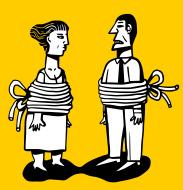 One of the unfortunate things about conflict is that the way people typically deal with it often keeps them trapped within it. They develop mutually reinforcing responses that prevent resolution and keep the conflict intact.
One of the unfortunate things about conflict is that the way people typically deal with it often keeps them trapped within it. They develop mutually reinforcing responses that prevent resolution and keep the conflict intact.
Conflict Trap
This is often what leads to divorces. A couple experiences conflicts within the marriage and they fail to find a way to resolve them. When the same type of conflict happens again and again, the spouses can begin to feel trapped. Of course part of what they are trapped by is their own failure to find ways to resolve these individual conflicts. They get locked in stand-offs, with each side attacking or trying to convince the other and neither backing down.
Once a divorce begins, unless the couple can resolve the necessary issues on their own, they appeal to some sort of third party for resolution. However, this can simply further the conflict trap if one or both sides views the third party as someone to convince of the rightness of their point of view.
I had a marriage end roughly this way. My wife was losing hope in being able to resolve our difficulties. She had a therapist who endorsed her feelings and didn’t challenge her to explore ways (say couples therapy) to save the marriage. This hardened my wife’s resolve to end the marriage and I ended up giving up. Fortunately we parted on very amicable terms but without exhausting all reasonable avenues to find a way out of our conflict trap.
When a divorcing person hires an attorney to take their case, the person usually expects the attorney to be “on their side” in the conflict and act accordingly. The attorney’s responsibility is then to act in the interests of their client and not the couple. The person hiring the attorney has often therefore perpetuated (sometimes unwittingly) the conflict trap that they find themselves in with the divorce, simply by the roles chosen for themselves and their attorney.
A goal of divorce mediators, collaborative divorce professionals and some family law attorneys is to move beyond the right-wrong adversarial framework. To help parties break out of the grip of the traditional approach and way of thinking, it is essential to keep the focus on how the conflict is handled rather than simply its substance.
What to do?
What is the alternative to getting mired in a conflict trap? In short, to make the hard and determined choice to work through the conflict together despite all the apparent emotional and other reasons not to.
Here is a definition of mediation from the excellent book “Challenging Conflict: Mediation Through Understanding” by Gary Friedman and Jack Himmelstein:
“Mediation is a voluntary process in which the parties make decisions together based on their understanding of their own views, each other’s, and the reality they face. The mediator works as a non-coercive neutral to help the parties negotiate an agreement that serves them better than their alternatives.”
The authors believe that the impulse to work through conflict together is inherent within us, even if it is buried or blocked. I agree.
Related Posts and Pages:
Conflict Pivots
Negotiation & mindset
High Conflict Personalities








My husband used mediation in his divorce and I’d say it did help. Yes a child was involved. His ex refused to give him time with his daughter and the mediator helped his ex realize he needed time and she was be unreasonable. So yes it helps.